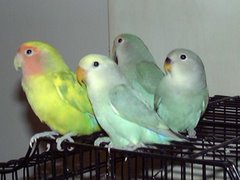Baby Lovebird Diseases
Do you know at what age the baby lovebirds should be separated from its parents? Baby lovebirds should be weaned (separated) from its parents at the age of 14-18 days.
I have heard so many stories of baby lovebirds being attacked by parents after this age. Some of the parents are even worse to peck the chicks until it gets bleeding. Apart from mechanical injuries received from the parents, baby lovebirds are suffered from few more dreadful diseases.
You might have noticed a sudden death among the baby lovebirds after getting separated from the mother. You might think it is due to lack of parental care. NO... It is your deficiency of providing proper temperature in the chicks cage. So do provide proper lighting to provide enough heat. You can place them in a large "brooder"-which you can make by putting a few inches of Carefresh Cage Liner in a plastic reptile container. You can get this stuff in all pet stores.
Other common disease of baby lovebirds are pachecos (PD), which nothing but Herpes infection. The symptoms of this disease is blisters which will burst and bleeding is noticed at the site of burst. Moreover, the lovebird chicks may be affected by this condition because the parents may transmit this virus.There is ever possibility of liver failure in this condition.
The affected lovebird will defecate blackish fecal material with offensicve smell. It is really difficult to cure this condition. The only way is culling the parents or retire the pair from breeding.
Other Common Baby Lovebirds Diseases
Other common baby lovebirds diseases include-
- Favus (ringworm)
- Knemidocoptic mange (scaly face)
- Hypovitaminosis A (nutritional roup)
- Candidiasis (thrush, oidiomycosis, moniliasis)
- Trichomoniasis










 Free Ads For Bloggers
Free Ads For Bloggers

